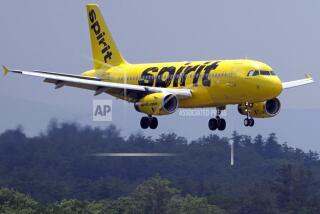United Airlines, US Airways Scrap Plans to Combine
- Share via
WASHINGTON — United Airlines and US Airways on Friday scrapped a planned $12.3-billion merger that would have created the nation’s largest airline, bowing to pressure from federal regulators who said the deal would raise fares and limit access for millions of travelers.
The Justice Department concluded in a long-awaited decision that it would sue the airlines to block the mammoth merger on the grounds that the deal would create a near-monopoly on some 30 air routes, hurting the flying public and violating antitrust laws.
Hours after that decision was announced, the two airlines issued statements of their own--saying that the deal was off. United’s parent company, UAL Corp., will pay US Airways a $50-million termination fee under the terms of the original merger agreement.
Analysts said executives at United Airlines probably were relieved by the day’s developments because it gave them a clear way out of a deal on which they had soured. But the breakup of the merger puts US Airways in a grave financial position because of doubts about whether the nation’s sixth-largest carrier can survive on its own.
The Justice Department’s quashing of the plan also has broader ramifications for the airline industry as a whole, casting a regulatory chill on prospects for consolidation among struggling carriers.
“Given what the Justice Department did today, I’d be surprised if any domestic carrier tries a merger in the near future,” said airline economics expert Darryl Jenkins, who heads George Washington University’s Aviation Institute. “Last year at this time every airline was talking to every other airline [about possible mergers], but now no one is.
“I think the merger mania is over,” he said.
That’s good news for airline travelers, consumer activists said.
“This is just the decision we were looking for,” said Paul Hudson, executive director of the Aviation Consumer Action Project, a group founded by Ralph Nader, after the Justice Department announced its opposition to the merger.
“If this had gone through, I think we would be seeing very anti-competitive consolidation very quickly. . . . We’d be looking at three or four major carriers that would control 75% to 90% of all traffic.”
The collapse of the deal also drew applause from members of Congress, who opposed the merger and had held hearings on the negative effect it could have had.
Chicago-based United Airlines, the nation’s second-largest carrier, reached an agreement last year to acquire its smaller Virginia-based rival for more than $4 billion in cash, plus assumed debt and leases totaling $12.3 billion.
But the plan sparked immediate concerns from consumer groups, unions at the two companies and federal antitrust regulators.
Even before the Justice Department’s decision, executives at UAL had begun expressing second thoughts in recent weeks about the merger, seeking to back out of the deal. United blamed resistance from federal regulators, but analysts said the $60-a-share price United agreed to pay for US Airways--considered high in light of financial troubles faced by airlines--was driving United’s case of buyer’s remorse.
United, under pressure from US Airways, grudgingly agreed this month to try to complete the deal and secure federal approval. But Friday’s announcement by the Justice Department was the final nail in the coffin.
After a months-long review, Justice Department regulators concluded that the merger would violate antitrust laws by reducing competition on dozens of air routes on which consumers spend more than $5 billion a year. Hardest hit would be Eastern Seaboard routes through Boston, Philadelphia, Washington and Baltimore, but travel through the West Coast and on international flights also would be hurt, the Justice Department’s review found.
“While mergers can further competition, this one does not,” Atty. Gen. John Ashcroft said. “If this acquisition were allowed to proceed, millions of consumers--business, government and families--would have little choice but to pay higher fares and accept lower-quality air service.”
The airlines, under recent fire from the public for flight delays and poor service, have faced increasingly tough antitrust challenges from the federal government.
In a suit brought under former Atty. Gen. Janet Reno, the Justice Department this year sought unsuccessfully to challenge American Airlines--and, by implication, other major carriers--over the use of predatory pricing to drive low-cost carriers out of business.
The Justice Department’s review of the United-US Airways merger, closely watched for months, marked the first major test of Ashcroft’s willingness to take on the airline industry.
At times, federal regulators have been willing to clear some airline mergers, most notably in March when the Justice Department approved American Airlines’ acquisition of Trans World Airlines.
But a very different set of financial circumstances was at work in that deal. TWA was on the verge of bankruptcy without a merger, the company was much smaller than US Airways, and its overlap with American’s routes did not pose as great a concern about competition.
US Airways has more options than did TWA, but with $23 million in net losses last quarter, it now faces serious questions about its financial future, analysts said.
With the breakup of the merger, US Airways could face more pressure to consider splitting up and selling off some of its assets, securing an international air partner and making wholesale cost reductions in its operations, analysts said.
“They tried to make a deal and it didn’t work out,” said Jenkins at the Aviation Institute. “Now what they have to do is get back to the business of running an airline.”
US Airways shares, which had climbed to $48 last year after the deal with United was struck, Friday fell 89 cents to close at $17.26 on the New York Stock Exchange. UAL declined 29 cents to $33.63, also on the NYSE.
More to Read
Inside the business of entertainment
The Wide Shot brings you news, analysis and insights on everything from streaming wars to production — and what it all means for the future.
You may occasionally receive promotional content from the Los Angeles Times.










